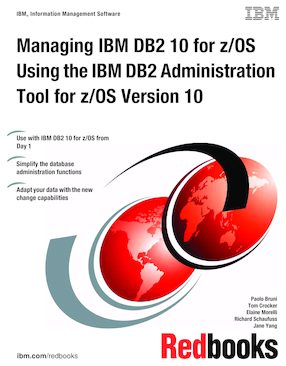
Published on 22 April 2011
Share this page:
ISBN-10: 0738435406
ISBN-13: 9780738435404
IBM Form #: SG24-7916-00
Authors: Paolo Bruni, Tom Crocker, Elaine Morelli, Richard Schaufuss and Jane Yang
Abstract
Today’s business environment has increased in the complexity and rate of change that a database administrator must control. The ability to respond quickly to a changing environment is constantly challenged by the explosion of data growth combined with a decline in an experienced work staff.
The IBM® DB2® Administration Tool for z/OS® Version 10 helps you become productive from Day 1 with DB2 10 for z/OS by using performance savings right away, lowering the CPU costs while reducing the batch window. Users experience higher data availability by easily managing online schema changes, including additional columns to indexes to use index-only access.
Customers are able to experience higher data availability through simplified recovery operations:
- Access new functionality in DB2 10 for z/OS to lower costs and improve efficiency both before, during, and after the DB2 migration process.
- Maximize the performance of your key DB2 business applications to speed their deployment in DB2 10 for z/OS.
- Improve the productivity and efficiency of your staff when DB2 10 for z/OS is running.
This IBM Redbooks® publication highlights the data administration enhancements introduced by DB2 Administration Tool for z/OS Version 10 by providing scenarios of their use with the new functions provided by DB2 10 for z/OS.
Table of Contents
Part 1. Introduction
Chapter 1. DB2 administration tools at a glance
Part 2. Installation and customization
Chapter 2. Product setup
Chapter 3. Product parameters
Part 3. DB2 9 for z/OS and prior support
Chapter 4. Native SQL procedures
Chapter 5. Universal table space
Chapter 6. CLONE tables
Part 4. Super processes
Chapter 7. The ALT line command
Chapter 8. The MIG line command
Chapter 9. DB2 Object Comparison Tool enhancements
Part 5. General DB2 Administration Tool functions
Chapter 10. Work statement lists
Chapter 11. Optional features
Part 6. DB2 10 for z/OS support
Chapter 12. Temporal tables
Chapter 13. Security
Chapter 14. Physical design
Chapter 15. Online schema evolution support
Chapter 16. General options
Part 7. Appendixes
Appendix A. Reference tables